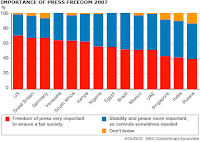
The suicide attack also killed at least 20 others at the end of a campaign rally. Police said a suicide bomber fired shots at Ms Bhutto as she was leaving the rally venue in a park before blowing himself up.
The attack occurred close to an entrance gate of the city park where Ms Bhutto had been speaking.
Benazir Bhutto was rushed to the hospital and taken into emergency surgery.
"At 6:16 p.m. she expired," said Wasif Ali Khan, a member of Bhutto's party who was at
 The death of the 54-year-old charismatic former prime minister threw the campaign for the Jan. 8 election into chaos and created fears of mass protests and an eruption of violence across the volatile south Asian nation. "The man first fired at Bhutto's vehicle. She ducked and then he blew himself up," police officer Mohammad Shahid said.
The death of the 54-year-old charismatic former prime minister threw the campaign for the Jan. 8 election into chaos and created fears of mass protests and an eruption of violence across the volatile south Asian nation. "The man first fired at Bhutto's vehicle. She ducked and then he blew himself up," police officer Mohammad Shahid said.
Ms Bhutto - the first woman PM in an Islamic state - was leaving an election rally in
Security forces have been placed on a state of "red alert" nationwide.
There were no immediate claims of responsibility for the attack. Analysts believe Islamist militants to be the most likely group behind it.
 Ms Bhutto, leader of the Pakistan People's Party (PPP), had served as prime minister from 1988-1990 and 1993-1996, and had been campaigning ahead of elections due on 8 January.
Ms Bhutto, leader of the Pakistan People's Party (PPP), had served as prime minister from 1988-1990 and 1993-1996, and had been campaigning ahead of elections due on 8 January.
It was the second suicide attack against her in recent months and came amid a wave of bombings targeting security and government officials.
Police confirmed reports Ms Bhutto had been shot in the neck and chest before the gunman blew himself up.
Ms Bhutto's coffin was removed from hospital in
Her husband, Asif Ali Zardari, has arrived in
Photos - Benazir Bhutto's coffin has now been taken from the hospital.


































